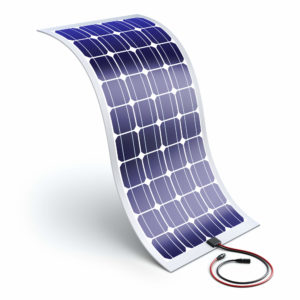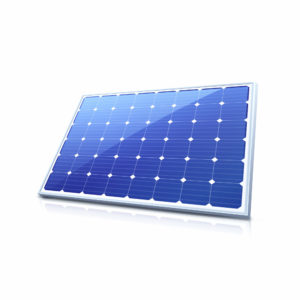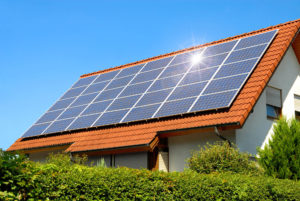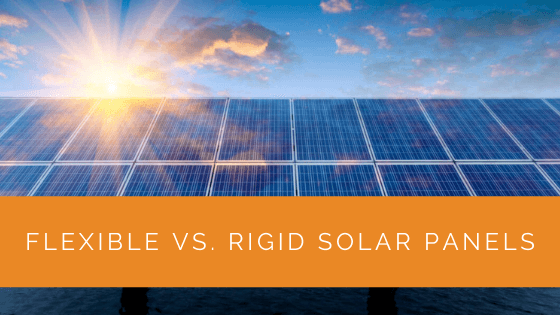The world of solar panels today is not the same as it was ten years ago. With the growing solar technology, alternatives to rectangular glass panels are popping up.
These creative new solar panels adhere to both functionality and design requirements. If you are one of the people who feel overwhelmed by different solar panels, this piece is for you!
On one side, rigid solar panels lead the race in terms of efficiency. On the other side, flexible solar panels can cater to unique applications. So, which solar panels should you choose – rigid or flexible?
We have outlined all the facts and differences you need to know about this flexible vs. rigid solar panel debate. So, are you ready to know your solar panel systems better?
Contents
- 1 Key Takeaways
- 2 What Is A Flexible Solar Panel?
- 3 What Are Rigid Solar Panels?
- 4 How Are Flexible Panels Different Than Rigid Panels?
- 5 Which Applications Are Best For Rigid And Flexible Solar Panels?
- 6 Expert Insights From Our Solar Panel Installers About Flexible Vs. Rigid Solar Panels
- 7 Experience Solar Excellence with Us!
- 8 Wrap Up
Key Takeaways
- Flexible solar panels offer greater installation flexibility and can be bent to fit curved surfaces, making them suitable for applications like recreational vehicles, boats, and caravans.
- Rigid solar panels are more efficient and cost-effective, making them a better choice for commercial and residential purposes.
- Flexible panels are lightweight and easy to install, but they have a shorter lifespan than rigid panels, which are durable and have longer warranties. Your choice between the two depends on your specific requirements and preferences.
What Is A Flexible Solar Panel?
Before we begin comparing the types of solar panel designs, let’s learn more about each. This section of the article focuses on flexible solar panels.
Solar energy is an industry that has rapidly advanced in recent years. One of the industry’s most popular technologies and innovations is flexible solar panels.
Latest developments in the material have allowed the industry to find an alternative to flat, rectangular, and rigid solar panels. Unlike rigid solar panels, flexible solar panels sport a clear plastic cover instead of glass.
Though the plastic panel isn’t as long-lasting as glass ones, it helps add flexibility to the structure. The result of these innovations is that solar panels can flex and bend. It means you can now install solar panels even on your curved roof!
Moreover, you may even find panels that can flex at angles of up to 50 degrees.

What Are the Coating Types in Flexible Panels?
Essentially, two different types of coating are available for flexible solar panels.
PET Laminated
It is a polyester-based lamination that forms the layers of solar panels to protect and cover the cells. PET laminated solar panels typically cost the lowest. They are also lightweight and allow optimum sunlight absorption. However, these solar panels are not as durable and long-lasting.
ETFE Laminated
Ethylene tetrafluoroethylene, or ETFE, is an artificial fluorine-based polymer. This solar panel coating combines flexibility and strength. The ETFE laminated solar panels also have high resistance to temperatures. They are stain and dust-resistant.
Compared to PET laminated flexible solar panels, ETFE counterparts are more durable.
What Are Rigid Solar Panels?
When people think of solar panels, flat rigid panels are the first thing that comes to mind.
The traditional or rigid solar panels have a robust aluminum casing. Manufacturers cover these rigid solar panels with strengthened tempered glass to let sunlight pass through. Tempered glass also plays the role of protecting internal solar cells.
This framing material creates a long-lasting and tough unit, and it is also durable and waterproof. Additionally, these panels are wind-resistant. In short, it is the very definition of longevity.
However, a few downsides to rigid solar panels include bulkiness, thickness, and not being apt for portability.
How Are Flexible Panels Different Than Rigid Panels?
Now that you have a fair idea about flexible and rigid solar panels, we compare them. This section will explore solar panel features and consider the pros and cons.
With this information, you can pick the right type of solar panel. So, let’s see how flexible and rigid panels compete and score in each feature!
What About the Weight?
The weight of a flexible panel is 20% less as compared to a rigid panel. It means that flexible panels are a better option if your roof is old and fragile. For this reason, you should consider the weight capacity of your roof before choosing.
The lightweight design of flexible solar panels makes them apt for roofs where weight is related to energy consumption. For instance, if you install numerous bulky rigid panels on an RV, its weight will increase fuel consumption.
Flexible panels are a far better option in terms of energy efficiency for motor-powered applications. Also, their overall weight offers them great portability. Some manufacturers also provide a solar panel carrying case with flexible panels.

Efficiency and Performance
Flexible solar technology has improved drastically in recent years. Earlier, only rigid solar panels could boast high efficiency and phenomenal performance. Thanks to technology, flexible panels these days have become just as efficient.
Nowadays, you can purchase flexible panels that are equally well-performing as rigid solar panels. High-quality flexible solar panels might even offer you a level of 18%-22% efficiency.
This high-efficiency rating states that under ideal sunlight conditions, the panels rated 18% will convert 18% of the received light into electricity.
However, if you do not have a wide budget to spare, the low-cost, flexible panels might not be very efficient. In such situations, rigid solar panels look like the best option. Even the low-end rigid panels offer decent performance and efficiency.
Price
We recommend using rigid solar panels if you are running on a budget. Since flexible panels are a relatively newer concept, they cost almost twice as much.
The good news is that this differential pricing will diminish as flexible solar panels evolve. The glass, aluminum, and other heavy materials in rigid panels cost quite a lot.
As the cost of manufacturing drops, buyers will see flexible solar panels becoming cheaper. Also, the materials in flexible panels are cost-effective. Hopefully, it won’t be long before flexible panels compete with their rigid buddies in the price arena.
Flexibility
Flexibility is the unique benefit of flexible solar panels. If flexibility happens to be one of your expected features, you should strike rigid solar panels off your list. Rigid solar panels are not bendable at all.
Depending on the model, flexible solar panels can bend at an angle of up to 50 degrees. All these features make the panels apt for curved surfaces.
Remember one point before you feel excited about bending your solar panels in every direction and angle. Solar panels work best when they face the sun directly. It is critical to angle the flexible panels in directions where they can receive maximum sunlight.
Though rigid panels are not flexible, they do not require a lot of thinking to position them. As a result of this structure, rigid solar panels are only apt for static locations.
Ease of Installation
Since the flexible panels are lightweight and bendable, they are fairly easy to install. You don’t have to attach any heavy frames with flexible solar panels. Moreover, flexible panels do not damage the mounting surface.
If you are hesitant to pierce any surface, such as your boat or RV, you should consider flexible panels. You should also ensure you fix the edge of your flexible panels properly.
In the case of rigid solar panels, they require a couple of additional steps for installation. You might have to drill holes and need the help of professionals to install them.
Lifespan
One of the most significant demerits of flexible panels is their lifespan. The flexible panels are prone to easy damage.
The rigid panels are exceptionally durable and offer rough and tough use. Besides, the rigid panels also come with a longer warranty period. In contrast, the warranty period for flexible panels only ranges between two to three years.
Since flexible panels are apt for on-the-go uses, they are more likely to damage. If you own a PET laminated flexible panel, it might not last more than five years. However, flexible panels with ETFE can offer you at least ten years of service.

Which Applications Are Best For Rigid And Flexible Solar Panels?
Rigid panels offer more long-lasting and cheaper solar electricity than their flexible counterparts. There are applications where rigid solar panels are a better choice.
You should pick rigid solar panels where rigidity and weight will not be an issue. Because of their simple characteristics, rigid panels are the go-to option for commercial and residential purposes.
In our opinion, flexible panels are not much behind in the race. Flexible panels pack unique features and offer many recreational applications. These panels allow portable solar energy generation.
If you ever head on a road trip or camping, flexible panels can accompany you. Their curved surfaces and bending ability suit recreational vehicles, boats, and caravans.
Moreover, these unique design flexible panels might also find applications in static spots. For instance, flexible panels might be different if you have a curved wall or roof. Similarly, if your roof is old and weak, you can opt for flexible solar panels as they are lightweight.
Hopefully, you know which situation is best for rigid or flexible panels!
Expert Insights From Our Solar Panel Installers About Flexible Vs. Rigid Solar Panels
Flexible solar panels offer unparalleled versatility, especially for non-traditional surfaces. Their lightweight design makes them ideal for applications where weight and flexibility are crucial, such as on RVs, boats, and curved roofs.
Senior Solar Technician
Rigid solar panels are the workhorses of the solar industry. They provide high efficiency and durability, making them the preferred choice for long-term residential and commercial installations.
Lead Solar Installer
The choice between flexible and rigid solar panels ultimately depends on the specific application and environment. Flexible panels are perfect for portable and temporary setups, while rigid panels excel in permanent installations with high energy demands.
Chief Solar Engineer
Case Study: Tailoring Solar Solutions to Client Needs
Background
At Solar Panels Network USA, we pride ourselves on providing customized solar solutions that meet the unique needs of our clients. Recently, we were approached by a client who required a solar panel system for both residential and recreational use, demanding flexibility and efficiency.
Project Overview
The client owned a suburban home and an RV, seeking to harness solar energy for both. The primary goal was to reduce dependency on the grid, ensure efficient energy use at home, and provide a reliable power source during travels.
Implementation
To address these diverse requirements, we recommended a hybrid approach, incorporating both rigid and flexible solar panels. Our solution involved:
- Installing high-efficiency rigid solar panels on the roof of the client’s home to maximize energy production and reduce electricity bills.
- Equipping the RV with lightweight, flexible solar panels that could conform to its curved surfaces and provide power on the go.
Rigid Solar Panel Installation: We installed 20 monocrystalline rigid panels on the roof of the client’s home. These panels were chosen for their high efficiency and durability, ensuring long-term performance and significant energy savings. The installation included a robust mounting system to withstand various weather conditions.
Flexible Solar Panel Installation: For the RV, we opted for ETFE laminated flexible panels due to their resilience and lightweight properties. These panels were affixed using adhesive mounts, allowing them to contour to the RV’s curved roof without compromising structural integrity. The flexible panels were connected to a portable battery storage system to provide consistent power during travel.
Results
The hybrid solar solution delivered excellent results for the client:
- Home Efficiency: The rigid solar panels on the home significantly reduced electricity bills, covering a substantial portion of the household’s energy needs. The client appreciated the seamless integration and the high energy output during peak sunlight hours.
- Mobility and Flexibility: The flexible panels on the RV provided reliable power during trips, ensuring that the client had access to clean energy without relying on campground hookups. The lightweight and flexible nature of the panels made them ideal for the mobile setup, reducing the overall weight and fuel consumption of the RV.
Summary
This case study highlights the importance of tailored solar solutions to meet diverse client needs. By combining the strengths of both rigid and flexible solar panels, we were able to provide a comprehensive energy solution that enhanced the client’s residential energy efficiency and supported their mobile lifestyle. At Solar Panels Network USA, we continue to innovate and adapt our solutions to deliver optimal performance and customer satisfaction.
Experience Solar Excellence with Us!
Trust in Solar Panels Network USA, where our seasoned experts deliver top-quality solar solutions for homes and businesses nationwide. With a legacy of countless successful installations and a commitment to sustainable energy, we’re your reliable partner in the solar journey. Ready for a brighter, eco-friendly future? Call us now at (855) 427-0058 and harness the power of the sun!
Wrap Up
Both flexible and rigid solar panels have their merits and demerits. This article weighs each type in six critical aspects to give you the results.
Regarding which type you should choose, it depends on personal requirements. The weight, size, shape, and features are some factors that should affect your decision.
Flexible panels are your best bet if you want a lightweight, renewable energy solution. Unlike rigid solar panels, flexible solar panels can also fit boats and RVs.
Regardless of whichever solar panel you buy, you’ll save plenty on utility bills. We are certain that solar panel systems are worthy investments. So, are you ready to live off the grid with solar panels?
About the Author
Solar Panels Network USA stands at the forefront of solar energy solutions, driven by a team of seasoned solar engineers and energy consultants. With over decades of experience in delivering high-quality solar installations and maintenance, we are committed to promoting sustainable energy through customer-centric, tailored solutions. Our articles reflect this commitment, crafted collaboratively by experts to provide accurate, up-to-date insights into solar technology, ensuring our readers are well-informed and empowered in their solar energy decisions.

